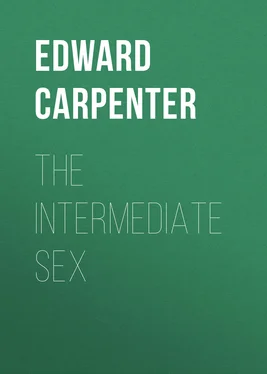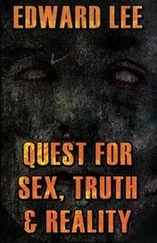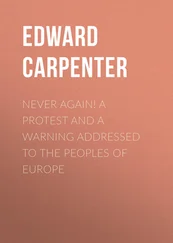Edward Carpenter - The Intermediate Sex
Здесь есть возможность читать онлайн «Edward Carpenter - The Intermediate Sex» — ознакомительный отрывок электронной книги совершенно бесплатно, а после прочтения отрывка купить полную версию. В некоторых случаях можно слушать аудио, скачать через торрент в формате fb2 и присутствует краткое содержание. Жанр: psy_sex_and_family, foreign_edu, foreign_desc, на английском языке. Описание произведения, (предисловие) а так же отзывы посетителей доступны на портале библиотеки ЛибКат.
- Название:The Intermediate Sex
- Автор:
- Жанр:
- Год:неизвестен
- ISBN:нет данных
- Рейтинг книги:4 / 5. Голосов: 1
-
Избранное:Добавить в избранное
- Отзывы:
-
Ваша оценка:
- 80
- 1
- 2
- 3
- 4
- 5
The Intermediate Sex: краткое содержание, описание и аннотация
Предлагаем к чтению аннотацию, описание, краткое содержание или предисловие (зависит от того, что написал сам автор книги «The Intermediate Sex»). Если вы не нашли необходимую информацию о книге — напишите в комментариях, мы постараемся отыскать её.
The Intermediate Sex — читать онлайн ознакомительный отрывок
Ниже представлен текст книги, разбитый по страницам. Система сохранения места последней прочитанной страницы, позволяет с удобством читать онлайн бесплатно книгу «The Intermediate Sex», без необходимости каждый раз заново искать на чём Вы остановились. Поставьте закладку, и сможете в любой момент перейти на страницу, на которой закончили чтение.
Интервал:
Закладка:
I have now sketched—very briefly and inadequately it is true—both the extreme types and the more healthy types of the ‘Intermediate’ man and woman: types which can be verified from history and literature, though more certainly and satisfactorily perhaps from actual life around us. And unfamiliar though the subject is, it begins to appear that it is one which modern thought and science will have to face. Of the latter and more normal types it may be said that they exist, and have always existed, in considerable abundance, and from that circumstance alone there is a strong probability that they have their place and purpose. As pointed out there is no particular indication of morbidity about them, unless the special nature of their love-sentiment be itself accounted morbid; and in the alienation of the sexes from each other, of which complaint is so often made to-day, it must be admitted that they do much to fill the gap.
The instinctive artistic nature of the male of this class, his sensitive spirit, his wavelike emotional temperament, combined with hardihood of intellect and body; and the frank, free nature of the female, her masculine independence and strength wedded to thoroughly feminine grace of form and manner; may be said to give them both, through their double nature, command of life in all its phases, and a certain freemasonry of the secrets of the two sexes which may well favour their function as reconcilers and interpreters. Certainly it is remarkable that some of the world’s greatest leaders and artists have been dowered either wholly or in part with the Uranian temperament—as in the cases of Michel Angelo, Shakespeare, Marlowe, Alexander the Great, Julius Cæsar, or, among women, Christine of Sweden, Sappho the poetess, and others.
III
The Homogenic Attachment
In its various forms, so far as we know them, Love seems always to have a deep significance and a most practical importance to us little mortals. In one form, as the mere semi-conscious Sex-love, which runs through creation and is common to the lowest animals and plants, it appears as a kind of organic basis for the unity of all creatures; in another, as the love of the mother for her offspring—which may also be termed a passion—it seems to pledge itself to the care and guardianship of the future race; in another, as the marriage of man and woman, it becomes the very foundation of human society. And so we can hardly believe that in its homogenic form, with which we are here concerned, it has not also a deep significance, and social uses and functions which will become clearer to us, the more we study it.
To some perhaps it may appear a little strained to place this last-mentioned form of attachment on a level of importance with the others, and such persons may be inclined to deny to the homogenic 12or homosexual love that intense, that penetrating, and at times overmastering character which would entitle it to rank as a great human passion. But in truth this view, when entertained, arises from a want of acquaintance with the actual facts; and it may not be amiss here, in the briefest possible way, to indicate what the world’s History, Literature, and Art has to say to us on this aspect of the subject, before going on to further considerations. Certainly, if the confronting of danger and the endurance of pain and distress for the sake of the loved one, if sacrifice, unswerving devotion and life-long union, constitute proofs of the reality and intensity (and let us say healthiness) of an affection, then these proofs have been given in numberless cases of such attachment, not only as existing between men, but as between women, since the world began. The records of chivalric love, the feats of enamoured knights for their ladies’ sakes, the stories of Hero and Leander, etc., are easily paralleled, if not surpassed, by the stories of the Greek comrades-in-arms and tyrannicides—of Cratinus and Aristodemus, who offered themselves together as a voluntary sacrifice for the purification of Athens; of Chariton and Melanippus, 13who attempted to assassinate Phalaris, the tyrant of Agrigentum; or of Cleomachus who in like manner, in a battle between the Chalkidians and Eretrians, being entreated to charge the latter, “asked the youth he loved, who was standing by, whether he would be a spectator of the fight; and when he said he would, and affectionately kissed Cleomachus and put his helmet on his head, Cleomachus with a proud joy placed himself in the front of the bravest of the Thessalians and charged the enemy’s cavalry with such impetuosity that he threw them into disorder and routed them; and the Eretrian cavalry fleeing in consequence, the Chalkidians won a splendid victory.” 14
The annals of all nations contain similar records—though probably among none has the ideal of this love been quite so enthusiastic and heroic as among the post-Homeric Greeks. It is well known that among the Polynesian Islanders—for the most part a very gentle and affectionate people, probably inheriting the traditions of a higher culture than they now possess—the most romantic male friendships are (or were) in vogue. Says Herman Melville in “Omoo” (chap. 39), “The really curious way in which all Polynesians are in the habit of making bosom friends is deserving of remark.… In the annals of the island (Tahiti) are examples of extravagant friendships, unsurpassed by the story of Damon and Pythias—in truth much more wonderful; for notwithstanding the devotion—even of life in some cases—to which they led, they were frequently entertained at first sight for some stranger from another island.” So thoroughly recognised indeed were these unions that Melville explains (in “Typee,” chap. 18) that if two men of hostile tribes or islands became thus pledged to each other, then each could pass through the enemy’s territory without fear of molestation or injury; and the passionate nature of these attachments is indicated by the following passage from “Omoo” (another book of Melville’s):—“Though little inclined to jealousy in ordinary love-matters, the Tahitian will hear of no rivals in his friendship .”
Even among savage races lower down than these in the scale of evolution, and who are generally accused of being governed in their love-relations only by the most animal desires, we find a genuine sentiment of comradeship beginning to assert itself—as among the Balonda 15and other African tribes, where regular ceremonies of the betrothal of comrades take place, by the transfusion of a few drops of blood into each other’s drinking-bowls, by the exchange of names, 16and the mutual gift of their most precious possessions; but unfortunately, owing to the obtuseness of current European opinion on this subject, these and other such customs have been but little investigated and have by no means received the attention that they ought.
When we turn to the poetic and literary utterances of the more civilised nations on this subject we cannot but be struck by the range and intensity of the emotions expressed—from the beautiful threnody of David over his friend whose love was passing the love of women, through the vast panorama of the Homeric Iliad, of which the heroic friendship of Achilles and his dear Patroclus forms really the basic theme, down to the works of the great Greek age—the splendid odes of Pindar burning with clear fire of passion, the lofty elegies of Theognis, full of wise precepts to his beloved Kurnus, the sweet pastorals of Theocritus, the passionate lyrics of Sappho, or the more sensual raptures of Anacreon. Some of the dramas of Æschylus and Sophocles—as the “Myrmidones” of the former and the “Lovers of Achilles” of the latter—appear to have had this subject for their motive 17; and many of the prose-poem dialogues of Plato were certainly inspired by it.
Читать дальшеИнтервал:
Закладка:
Похожие книги на «The Intermediate Sex»
Представляем Вашему вниманию похожие книги на «The Intermediate Sex» списком для выбора. Мы отобрали схожую по названию и смыслу литературу в надежде предоставить читателям больше вариантов отыскать новые, интересные, ещё непрочитанные произведения.
Обсуждение, отзывы о книге «The Intermediate Sex» и просто собственные мнения читателей. Оставьте ваши комментарии, напишите, что Вы думаете о произведении, его смысле или главных героях. Укажите что конкретно понравилось, а что нет, и почему Вы так считаете.












